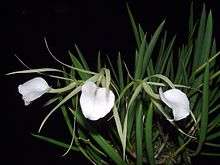Brassavola nodosa
| Lady of the night | |
|---|---|
 | |
| Scientific classification | |
| Kingdom: | Plantae |
| (unranked): | Angiosperms |
| (unranked): | Monocots |
| Order: | Asparagales |
| Family: | Orchidaceae |
| Subfamily: | Epidendroideae |
| Tribe: | Epidendreae |
| Subtribe: | Laeliinae |
| Genus: | Brassavola |
| Section: | B. sect. Cuneilabia |
| Species: | B. nodosa |
| Binomial name | |
| Brassavola nodosa (L.) Lindl. | |
| Synonyms[1] | |
| |
Brassavola nodosa is a small, tough species of orchid native to Mexico (from Tamaulipas south to Chiapas and the Yucatán Peninsula), Central America, the West Indies, and northern South America (Venezuela, Colombia, Guyana and French Guinea).[1][2] It is also known as "Lady of the Night" orchid due to its citrus and gardenia-like fragrance which begins in the early evening. Its fragrance and whitish-green color combine to attract night-pollinating moths.
The diploid chromosome number of B. nodosa has been determined to be 2n = 40[3]
References
- 1 2 Kew World Checklist of Selected Plant Families
- ↑ Hágsater, E. & G. A. Salazar. 1990. Orchids of Mexico, pt. 1. Icones Orchidacearum (Mexico) 1: plates 1–100. Asociación Mexicana de Orquideología, México, D.F.
- ↑ page 250. Leonardo P. Felix and Marcelo Guerra: "Variation in chromosome number and the basic number of subfamily Epidendroideae (Orchidaceae)" Botanical Journal of the Linnean Society 163(2010)234-278, The Linnean Society of London
External links
| Wikimedia Commons has media related to Brassavola nodosa. |
This article is issued from Wikipedia - version of the Thursday, February 11, 2016. The text is available under the Creative Commons Attribution/Share Alike but additional terms may apply for the media files.